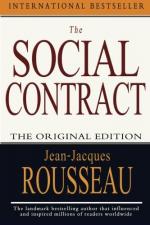
|
| Name: _________________________ | Period: ___________________ |
This test consists of 15 multiple choice questions and 5 short answer questions.
Multiple Choice Questions
1. The Sovereign Will is subject to which of the following in a constant way?
(a) Pressures.
(b) Debates.
(c) Fluctuations.
(d) Battering.
2. The author believes that the government does not have the right to lay greater responsibility on one person than another because the government then becomes which of the following?
(a) General.
(b) Specific.
(c) Temporary.
(d) Personal.
3. According to the author, the larger that a state is, the less influence which of the following will have?
(a) The Legislator.
(b) The Magistrate.
(c) The army.
(d) The individual.
4. According to the author, every human being lives in which of the following?
(a) Need.
(b) Chains.
(c) Houses.
(d) Skin.
5. According to the author, which of the following does man gain in the social contract?
(a) Spiritual liberty.
(b) Social liberty.
(c) Political liberty.
(d) Civil liberty.
6. The author states that every free act must have two causes; moral and which of the following?
(a) Spiritual.
(b) Psychological.
(c) Physical.
(d) Legal.
7. The author states that slavery is established and perpetuated by which of the following?
(a) A majority.
(b) War.
(c) Taxes.
(d) Force.
8. Which of the following terms refers to a generalized rule, way of communicating, or way of conducting affairs?
(a) Convention.
(b) Constitution.
(c) Society.
(d) Contract.
9. The author believes that a man's hold on his personal property is which of the following when he is part of the state?
(a) Decreased.
(b) Harmless.
(c) Safer.
(d) Increased.
10. According to the author, no man has any natural authority over which of the following?
(a) His beliefs.
(b) His fellows.
(c) His family.
(d) His state.
11. The author believes that Grotius formed his theories with the sole aim of flattering and ingratiating himself with whom of the following?
(a) The French king.
(b) The English king.
(c) The German king.
(d) The Spanish king.
12. How rare does the author think that individuals who possess the ideal traits of legislators are?
(a) Not rare.
(b) Extremely rare.
(c) So rare that they do not exist.
(d) Moderately rare.
13. The author states that the Magistrate receives power to lead the government from which of the following?
(a) Natural law.
(b) God.
(c) The constitution.
(d) The people.
14. Who does the author cite as an example of someone who attempted good reform, but did not know his people well enough to succeed?
(a) Catherine the Great.
(b) Nicholas the Great.
(c) Peter the Great.
(d) Ivan the Great.
15. The author believes that there must be a balance between the size of the state and the ability of which of the following?
(a) The government to administer it.
(b) The land to support it.
(c) The people to know it.
(d) The legislators to evaluate it.
Short Answer Questions
1. The discussion that the author has about population would be described today using which of the following terms?
2. The author states that moral equality must be substituted for which of the following in a social contract?
3. Of the three wills operating within the Magistrate, which one has to be strongest for good government to exist?
4. The private will is inclined to which of the following?
5. The fourth type of law is the moral law of custom, also referred to as which of the following?
|
This section contains 514 words (approx. 2 pages at 300 words per page) |

|




